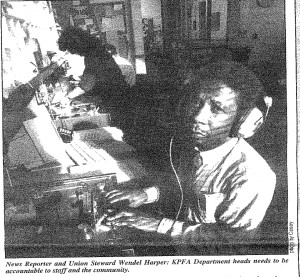by Adrienne Lauby
Something remarkable happened earlier this year. Two devoted KPFA listeners made bequests to KPFA in their wills totaling nine hundred and fifty-eight thousand dollars — nearly a million greenbacks. While these unexpected gifts allowed our sister station KPFT to finally replace their failing transmitter and made some improvements in KPFA’s building, most of the money vanished down a rabbit hole in routine salary expenses.
It was remarkable to have such generous gifts. It was also remarkable that the SaveKPFA-led governing board allowed the money to disappear so quickly.
Here’s the details.
An Unrealistic Budget
The local station board adopted KPFA’s 2015 budget a year ago in the fall of 2014. In what has become a yearly ritual, United for Community Radio board member, Janet Kobren, criticized the budget as unrealistic. The Save KPFA board members, as usual, claimed that the budget was reasonable because the projected expenses would be covered by an increase in fund drive income.
Why, one asks, was it reasonable when, KPFA subscriber numbers are decreasing? In only three years, KPFA’s subscriber numbers have dropped by 1800 individuals. And, what was the projection based on, given that fund drive numbers have dropped consistently over the last decade?
With the strong Save KPFA majority, the board passed the budget with the anticipated fantasy income intact.
That budget was again questioned when it went to the Pacifica National Board for approval. The National Finance Committee asked the same questions that were asked by Janet Kobren on the local level. With several stations in the network unable to meet a payroll in the previous year and facing other financial problems, the Finance Committee wasn’t in the mood for fantasies. They said that KPFA’s income projections were over-estimated by at least $250 thousand dollars (1) and told General Manager Quincy McCoy to make cuts to bring that figure down.
Standard budget practices are contentious at KPFA. Generally, an organization makes its budget carefully, setting out the expenses it knows it can meet, and happily accommodating any additional money in a quarterly budget review process.
At KPFA, most of the expenses are fixed. There’s no wiggle room in the electric bill and license fees, and only four managers do the administration and engineering work of a 300 person staff. To stay within amount of money donated by the listeners, KPFA would have to lay off some of its union staff members. Under SaveKPFA’s board majority and union leadership, this has become an unthinkable taboo.
The Bequests
Near the beginning of the year, $958 thousand in unexpected bequest income was greeted with great pleasure. For one thing, it alleviated General Manager Quincy McCoy’s immediate problem. As I said, the national board had told him to make cuts and later added that any cuts should include management. In addition, McCoy knew that after the spring fund drive, it would be obvious he didn’t have the cash to make his payroll.
McCoy knew that layoffs that would be greeted with a storm of public criticism and perhaps even the outright rebellion faced by former Pacifica Executive Director, Arlene Engelhardt, when she ordered tough cuts to save KPFA from bankruptcy in 2010. Nevertheless, McCoy began union negotiations to make the necessary cuts.
When news of the unexpected bequests arrived, McCoy not only cancelled the union negotiations but also cancelled two fund drives. Save KPFA’s board members and staff representatives tacitly agreed with him. McCoy went on air to proclaim the fund drive cancellation and many paid staff members also made triumphant on-air announcements. They all spoke in glowing terms about “KPFA’s promise to the listeners” claiming that KPFA had cancelled the summer drive because listeners had asked for it.
There was a vague thank you for those who include KPFA in their wills in an announcement encouraging more listeners to leave some of their cash to KFPA. But, no one made it clear that the summer fund drive was cancelled because of the generosity and love of two deceased listeners.
This emotional manipulation of KPFA’s listeners hit a new propaganda low in the station that claims to “tell truth to power.”
How the Money was Spent
General manager, Quincy McCoy presented his plans for spending the money to the local station board after that spending was in progress. United for Community Radio representatives reminded the board that it is their responsibility to set budgets and asked that there be a discussion with Mr. McCoy about his plans for the money. The SaveKPFA majority did not agree and managed the meetings to keep such a discussion off the agenda.
Here’s numbers the General Manager gave to the local board (rounded to the nearest hundred):
$119,000 help for other stations in the network2
$110,250 building improvements (carpeting, elevator repair, painting)
$30,000 new membership software
$223,400 routine payments (National Office and Pacifica Archives)3
$350,000 salaries4
$134,500 lost income due to cancelled fund drives
In short, only $260 thousand dollars of these incredible gifts were spent on one-time expenses and improvements. $573 thousand dollars were frittered away on expenses that should have been covered by KPFA’s usual fundraising.
A Missed Opportunity
It’s fairly standard financial practice to sequester unexpected and large gifts. It’s Bookkeeping 101 that large gifts should not be used for routine expenses. To use gifts to push tough decisions down the road creates an unrealistic expectation that expenses can and will remain high. It’s far better to make the tough decisions based on the routine income and use the major money for something that will strengthen the organization over the long haul.
Here’s a few things this money was NOT used for:
- A major outreach effort to new, more diverse and younger audiences.
- An improvement in KPFA’s digital and social media presence in order to connect with audiences who are migrating to wireless and web devices.
- A revamp of the program grid with new programs, hosts and formats.
- Remodeling work on the crumbling and currently uninhabitable property owned by KPFA on the corner of Martin Luther King Jr. Way and Berkeley Way.
These projects, many of them proposed as no-brainers by multiple listeners and staff members, have been on the back burner for years. Managers haven’t been able to find the money and staff time to spearhead anything beyond the next payroll.
Large gifts should be used for large projects, items that can’t be funded with the usual income. They should be used to initiate well-planned projects that might develop greater income, larger audience or be of use to listeners over the long haul. Naturally, most organizations are tempted to use an unexpected gift to relieve some immediate or chronic stress. But generations of bookkeepers and accountants have taught us that is the fast road to regret. If an organization receives a large gift, it should leave something tangible in place when it is gone.
Under Save KPFA and Quincy McCoy’s watch, these lessons have yet to be learned. Next year, unless more generous and devoted people die, KPFA will return to the grind of one fund drive after another, with the energy of paid and unpaid staff alike tied up in, (have I said this enough?) an unsustainable level of staffing.
10-18-15
- Link to National Finance Committee meeting. Begin listening at 9:40 to hear the resolution.
- $100 thousand was loaned to KPFT in Houston who had been operating at 30-50% of its authorized power (100 kilowatts) for almost three years in order to stay on the air despite a failing transmitter. This money allowed them to make the replacement. Approx. $19 thousand was loaned to WBAI to help them meet an immediate legal obligation. It’s unlikely either loan will be repaid.
- KPFA’s obligations to pay a share of the national Pacifica office cost as well as support the Pacifica Archives are anticipated expenses that should be covered in routine fund drive income.
- Salaries ($350 thousand). This figure was called a 3-month reserve but it will be, obviously, a reserve that is quickly spent.



